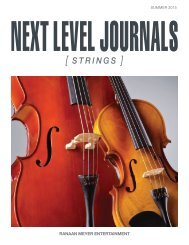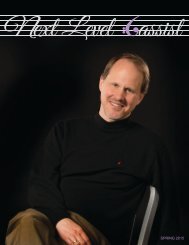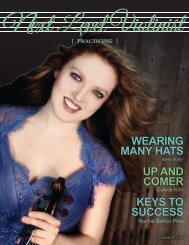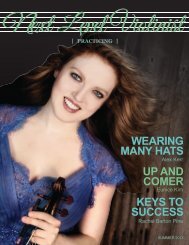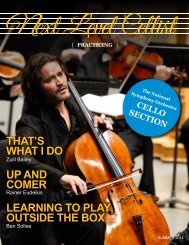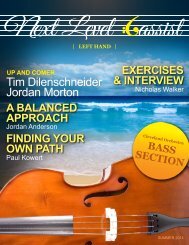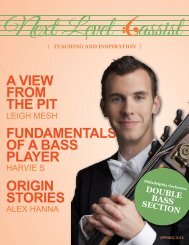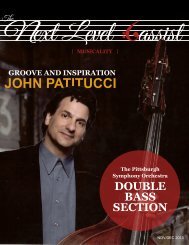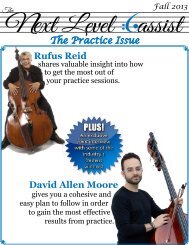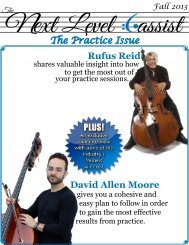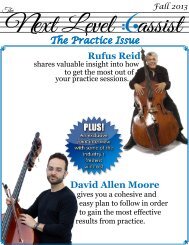Next Level Cellist Musicality Issue
Featuring articles by Alisa Weilerstein and Efe Baltacigil, a spotlight on the Chicago Symphony Cello section, and a duet by Ranaan Meyer
Featuring articles by Alisa Weilerstein and Efe Baltacigil, a spotlight on the Chicago Symphony Cello section, and a duet by Ranaan Meyer
You also want an ePaper? Increase the reach of your titles
YUMPU automatically turns print PDFs into web optimized ePapers that Google loves.
The Well-Traveled Musician<br />
I think a big reason why I enjoy splitting my time evenly between<br />
the North America and Europe is that I get so many different<br />
perspectives and thoughts from both cultures. My own approach<br />
is really the result of osmosis, thanks to having had contact with<br />
so many unique musicians. Musicians are capable of learning so<br />
much from interaction with other great artists. This is one of the<br />
most important components of anyone’s musical education. I feel<br />
like I’m an eternal student, trying to take in as much as possible.<br />
One of the things I’ve always hated is labels. I’ve found that no musician<br />
falls into a particular category, and you can always find something else<br />
when you’re looking for it. One comment on my playing has always<br />
stood out and made me happy: “You don’t really have a school, I can’t<br />
tell where you’ve been trained.” Sounding like a mishmash of traditions<br />
to me is a comment on forming your individual voice. How do you go<br />
about forming this voice? Get your hands on everything - old recordings,<br />
new recordings, different nationalities, different artists! No matter<br />
where you come from, we do communicate in a universal language.<br />
It doesn’t matter what your background, it’s what you do with<br />
the information.<br />
I try to practice what I preach and listen to a great variety of recordings.<br />
I do go through periods where I don’t listen to a large quantity if I’m<br />
too busy, or if I’m developing a relationship with a new piece. Most<br />
of the time, though, I mix the old and the new because it’s important<br />
to reflect on the past and find new sources of inspiration. Like many<br />
professional players, I don’t have much time to attend concerts and<br />
find out what’s currently out there.<br />
These days I’m not listening to that many cellists. I’m listening to a lot<br />
of symphonic recordings, with both living and deceased conductors.<br />
I’ve always listened to a lot of Claudio Abbado recordings with the<br />
Berlin Philharmonic and Vienna, and his passing has been a reason<br />
to reflect on them again. I listen to a lot of Bernstein and Barenboim<br />
as well - these are minds that I respect so much. It’s always been<br />
fascinating to contemplate how you structure a Mahler symphony, or<br />
how you make sense of 9 Beethoven symphonies, or Wagner operas.<br />
I was scared by Wagner in my early twenties but now I’m absolutely<br />
entranced by it.<br />
When I’m listening to cellists, I listen to Casals and Jacqueline du Pre,<br />
Rostropovich, Piatigorsky, Yo-Yo Ma, and of course the cellists of my<br />
generation. It’s very interesting for me to hear different perspectives.<br />
I’ve always been in love with Casals’ recordings of the Bach suites.<br />
In terms of stylistic differences, they seem “outdated” in some ways,<br />
but I find them to be the most honest and intelligent recordings of<br />
the works. Jacqueline du Pre had such a short career, but she really<br />
recorded every concerto that was major at the time - every great<br />
Romantic concerto she performed is an excellent resource. Rostropovich<br />
takes me right back to when I was studying the Shostakovich concerti,<br />
Prokofiev Sinfonia Concertante, and Britten Cello Symphony. We<br />
almost owe him above anyone else for his recordings of the 20 th century<br />
cello repertoire. Beyond the classical world, I’m a big fan of Bjork, and<br />
I think the Beatles are geniuses. I listen to bossa nova, Venezuelan folk<br />
music, some Argentinian folk music, and Portuguese fado.<br />
The Future for <strong>Cellist</strong>s<br />
<strong>Cellist</strong>s today still don’t fully pursue their instruments as being as<br />
versatile as a violin. They’re not fully convinced that it is a true<br />
solo instrument. This is despite the fact that cellists agree that our<br />
instrument covers the range of the human voice and as such, it is a<br />
very relatable instrument. Honestly, I believe that it’s the chameleon<br />
of instruments, and it can really be anything we want it to be. Students<br />
especially need to embrace that fact and pursue it.<br />
One skill I would love to see my fellow musicians cultivate to a high<br />
degree is the performance mentality. I find a lot of performance<br />
anxiety in students today. I remember I was around 7, and I was<br />
preparing to do a small recital at the Cleveland Institute of Music.<br />
I was all dressed up and ready to go with my fractional sized cello.<br />
My mom looked at me and said “There’s no reason to be nervous<br />
because you’re very talented and you’re very prepared.” I think about<br />
that to this day, even though it’s so basic. We forget this in the throes<br />
of our doubts and the stress of trying to absorb everything we’re told.<br />
Knowing that, and really believing that to your core, for me was<br />
really powerful.<br />
Ultimately, any musician’s primary job is to communicate. We are so<br />
lucky to have this incredible language that touches everyone if we do it<br />
right. We can convey these ideas and emotions to touch everyone all at<br />
once, yet in an individual way. The Prokofiev Sinfonia Concertante is<br />
one of my favorite vehicles for this, because it’s a playground of voices<br />
and colors. Someone asked me once: Alisa, there are so many notes,<br />
and it’s so weird! The 2nd movement is twice as long as the others,<br />
and there are all these crazy characters. What do you imagine?<br />
To me, it’s like a big ballet - I think Romeo and Juliet is all over it.<br />
That piece in particular seems to me like a sequence of paintings, with<br />
colors and images that alternate being vivid, bucolic, wild. For me, as<br />
an artist to delve into that, it’s so much fun. I really enjoy performing<br />
it, and I hope that I can share that experience with audiences.<br />
A Note on My Gear<br />
I found something that really works in most halls - as a soloist you<br />
need to be able to project in 3,000 foot concert halls as well as recital<br />
halls. I use Jargar forte A and D strings - they are not a common string<br />
in the US - and I use Spirocore medium tension G and C strings. I<br />
have a 1790 William Forester cello and an Emile Ouchard bow. I have<br />
used the same cello since I was 16. I use Bernardel rosin, and I am<br />
a very heavy rosin user (ask anyone I know!). The only reason I use<br />
different rosins is when I forget mine, which happens much more<br />
often than I’d like to admit.<br />
For bow rehairs, I am very particular about the hair I get on my bow,<br />
when I have the luxury of choice. One of the strenuous aspects of this<br />
lifestyle is not always having control over who performs these services<br />
or where I can get them done. I’ve had jobs done is various cities when<br />
I just need it done, but if possible I like to go to Gregory Wylie in New<br />
York. I’ve also gone to Salchow, who has done a fantastic job. The<br />
single greatest rehair I’ve ever had done in my life was done in Vienna<br />
by Christina Eriks, and it actually lasted me more than a month, which<br />
is extraordinary for me!<br />
SPRING 2014 NEXT LEVEL CELLIST<br />
9




